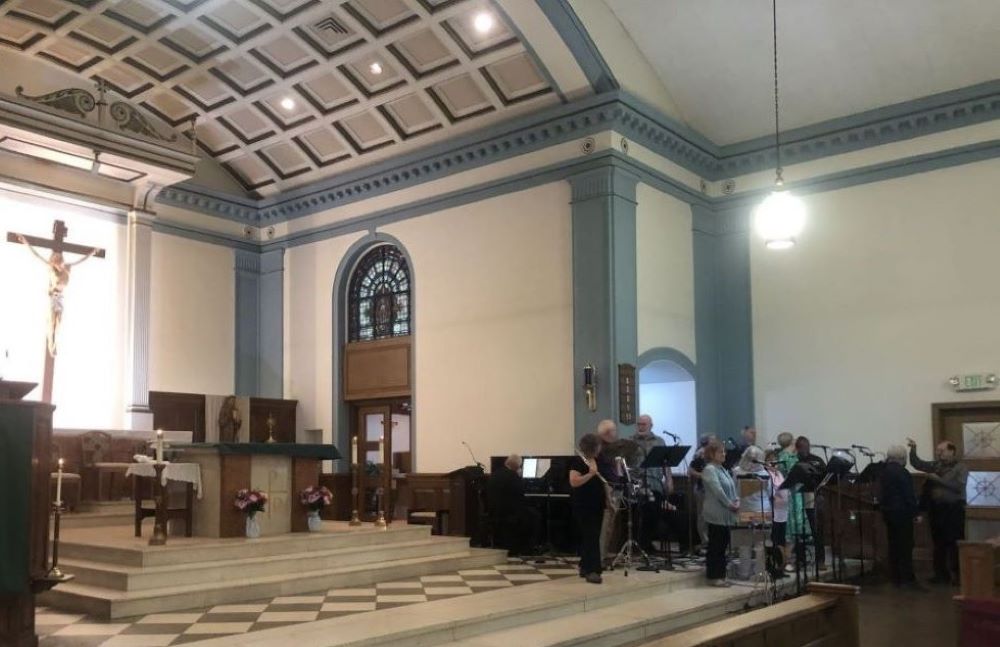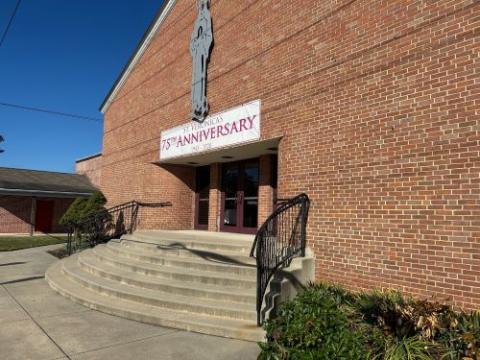
St. Anthony of Padua, one of the closed parishes in the Baltimore Archdiocese's "Seek the City to Come" initiative, is pictured in an undated photo. The archdiocese announced in May that it would reduce the number of parishes in the territory from 61 parishes at 59 worship sites to 23 parishes at 30 worship sites. (Courtesy of Mary Comer)
We had been hearing about the "Seek the City to Come" initiative from the Archdiocese of Baltimore for over a year. Though it was never overtly said, those of us who were reading between the lines knew that it would result in the closing of a few parishes.
But it wasn't until March that I realized how big the initiative would actually be. I read in Catholic Review that, under the current proposal, only 19 worship centers would remain in the Seek the City territory. Nineteen worship centers out of a current 62? This meant 43 parishes would close.
"But surely," I thought, "this wouldn't affect my parish." We are financially stable, always paid the full cathedraticum, we had pews half-full of dedicated older parishioners, a few younger families and we had a huge parking lot (where I taught my kids to ride bikes and drive cars).
Despite my confidence that my parish, Church of the Annunciation, was safe from closure, I still wanted to better understand why there would be such a drastic closing all at once. In my sadness for these other parishes, I decided that I should try to visit all the parishes that would close that I had never been to.
It felt like a gladiator arena with everyone jumping up and down shouting, 'Look at me, look at me, look at all we do for our community' with the unsaid 'close the other parishes' hanging in the air.
Though no proposed or final model had been released, I wanted to get a head start. I began with St. Anthony of Padua on Palm Sunday. What I saw was not the dwindling community that I expected, but rather a vibrant, active, faithful community (and very comfortable kneelers).
In his homily, Fr. Evan Ponton referenced a line from the second reading about Jesus "emptying himself." He made a direct connection between Jesus emptying himself and our own need to collectively empty ourselves as we prepared for the upcoming announcements of "Seek the City to Come." I walked out thinking that surely a thriving community wouldn't close? Surely they wouldn't be on the list.
I continued my journey sporadically for the next few weeks. The archdiocese released one proposed model that listed 26 worship sites that would remain open. It was as shocking as I expected it to be.
I attended the April 25 meeting at Archbishop Curley High School and listened to people pleading for their parishes. It was disheartening. It felt like a gladiator arena with everyone jumping up and down shouting, "Look at me, look at me, look at all we do for our community" with the unsaid "close the other parishes" hanging in the air. The process, however necessary, taxed our sense of connection to one another as members of the Archdiocese of Baltimore.
Nearly 1,000 people attend an April 30 listening session for the Archdiocese of Baltimore's "Seek the City To Come" initiative at the Cathedral of Mary Our Queen in Homeland, Maryland. (OSV News/Catholic Review/Kevin J. Parks)
But the listening session at Archbishop Curley was not without its special moments. I was so impressed with the representatives from St. Veronica that I visited Mass there the following Sunday. It was a spirit-filled service that I enjoyed immensely. Afterward, there was an impromptu town hall and the people seemed ready to fight for their community.
The next week, at St. Pius X, I saw a different type of service. It was also spirit-filled, with an impressive pianist. When I met several parishioners at a restaurant after Mass, they also seemed eager to fight for their parish.
When the final model came out, announcing only 30 worship sites would remain by the end of 2024, I was elated that St. Veronica was to stay open and I was grateful for this vibrant community.
But then I got a bad feeling in my stomach as I checked and double-checked the list. My parish was to be closed. How could this be? Like many in my community, I was confused and angry.

St. Veronica Church, one of the churches the Baltimore Archdiocese closed in its "Seek the City to Come" initiative, is pictured in an undated photo. (Courtesy of Paul Smith)
But then I made the effort to focus that anger. I yearned to understand, but answers never came. I wondered if there were patterns and I sought to learn more about the communities slated to close. I literally doubled-down on my efforts to visit all the closing parishes by attending both Saturday and Sunday Masses all summer.
I saw church buildings with the paint literally peeling off the bathroom walls. I also saw some well-maintained church buildings wherein nobody greeted me or spoke to me before or after Mass. It seemed like different parishes were poor in different ways.
One parish I visited on a Saturday vigil Mass had solid financials, a beautiful sanctuary and nine people attending Mass (counting me and the priest). I saw that financial viability could not be the only criteria considered. Did I see my own parish's future in this church? A Mass held before an empty sanctuary with no congregation?
There were many redeeming features to my journey as well. I met many wonderful people at their parishes. I even met a couple from Howard County who were also trying to attend churches that were closing. We exchanged phone numbers and started sharing notes. I attended many lively services with friendly and Christ-like souls. I saw that not all Catholic communities were interchangeable. Different communities had different styles of worship.
But the hard mystery remained. To me, there seemed to be no rhyme or reason to the type of parishes that were closing. There seemed to be no grand agenda. There was no conspiracy against any one type of demographic or worship style. I saw a wide variety of parishes — white, Black, Hispanic, Filipino. Well-kept buildings and buildings in disrepair. Progressive and conservative communities. Seek the City seemed to be an equal opportunity closer.
After months of attending Mass on both Saturday and Sunday and months of not attending Mass at my own parish, I finally concluded my journey at St. Ann's in late September. That Sunday, the homilist and former pastor, Fr. Joe Muth, also spoke about Seek the City. He quoted St. Paul, "If one part of the body is hurting, then the whole body is hurting." Muth said, "If we are all not hurting, it is because we are not connected."
Auxiliary Bishop Bruce Lewandowski, urban vicar, speaks to an overflow crowd attending a Seek the City To Come meeting for the Black Catholic community April 23 outside St. Frances Academy in Baltimore. (OSV News/Catholic Review/Kevin J. Parks)
This makes me wonder: Are we all connected? Is the whole of the Archdiocese of Baltimore feeling the pain of emptying out? Or is it going to be business as usual among the parishes that are not closing? Will the members of these communities stand by and wait for their pastors and bishops to lead them into this bold new city to come? Will the surviving parishes sacrifice and hurt with us? Will they welcome us as refugees or will they do the hard work of integrating us into their style of worship to grow into a whole new community? What role do the closing parishes have in merging into these new communities?
After many months and asking many questions, I have concluded that the answers are up to all of us.
Advertisement








